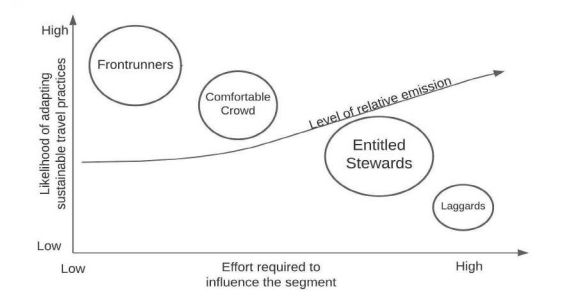ETC Investigates Impact of Covid-19 on Tourists’ Sustainable Travel Attitudes
The European Travel Commission (ETC) recently released a report to help destinations in Europe better understand consumers’ attitudes in the pandemic era.
In its latest study “Sustainable Travel in an Era of Disruption: Impact of Covid-19 on Sustainable Tourism Attitudes”, the ETC analyses the extent to which tourists are ready to adopt more sustainable approaches while travelling.
“By exploring this ‘value-action gap’ ETC supports destinations and the wider tourism sector in the transition towards a more sustainable tourism ecosystem,” the ETC said in an announcement.
According to the study’s findings, pre-pandemic, current and projected travel behaviour of the respondents align, indicating little to no impact of the pandemic on the likelihood of adopting more sustainable travel behaviours in the future. However, the value orientation, belief and norm patterns of the respondents proved to be good predictors of travel behaviour – both pre-COVID-19 and in the projected travel behaviour.
Respondents with stronger value orientations have higher levels of awareness of the consequences of their actions and ascription of responsibility and thereby feel more obliged to act in a responsible manner.
The ETC’s analysis revealed four distinct clusters:
– Frontrunners: Low-footprint travellers with the highest likelihood of adopting sustainable travel behaviour in the future. The cluster with the strongest biospheric and altruistic value orientation.
– Comfortable Crowd: Habitual low-footprint travellers with interest in alternative destinations in ones’ proximity and in travelling in low season.
– Entitled Stewards: Medium-footprint travellers who are less likely to compromise on location and time of travel but willing to adjust otherwise.
– Laggards: Habitual high-footprint travellers with the lowest level of likelihood for considering sustainable alternatives in the future. The cluster with the weakest biospheric and altruistic value orientation.

Likelihood of adapting sustainable travel practices vs efforts required to influence the segment and level of relative emission. Source: ETC
Overall, the ETC’s study shows that travellers are most likely to adopt sustainable practices in the behavioural category of interacting with the local community and immersing in local life, learning about the local traditions and trades, buying local products and choosing locally owned restaurants while in the destination.
On the other hand, travellers are least likely to opt for alternative transportation modes and consider booking with eco-certified service providers. Money and time are constraints that were found to have a significant impact on the likelihood of adopting more sustainable travel practices in the future.
The ETC’s report also provides recommendations on strategic actions for European DMOs and NTOs to focus on stimulating sustainable travel behaviour among each of the four identified clusters.
“Understanding travellers’ behavioural trends and expectations in a pandemic world is paramount to improving customer experiences,” the ETC said.
The report can be downloaded here.









